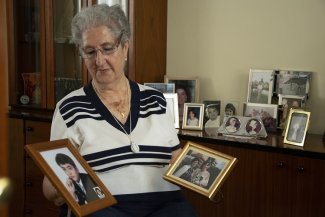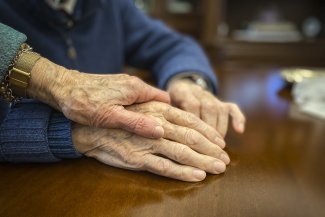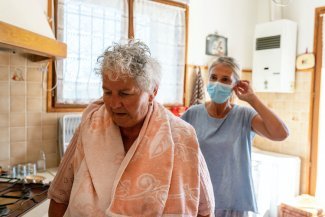
Participants and staff of the neurocognitive school of Casares, a village in southern Spain.
Europe is ageing. But it is not ageing equally. At least one in five of the 90 million Europeans over 65 (projected to rise to 130 million by 2050) live in a rural area where they have fewer public services, worse public transport, greater distances to the closest hospital and fewer care professionals.
In regions such as eastern Germany, northern/central Italy and north-western/central Spain, the population pyramid has widened to such an extent that the elderly now represent between 20 and 30 per cent of the total number of people in their communities. The smaller and more depopulated the municipality, the larger the ratio of elderly residents forced to face the challenges of ageing on their own.
Elderly care in rural areas has traditionally fallen on families and members of the community. Some sociologists call this the ‘support generation’. According to Ángel Martín, professor of sociology at the University of Salamanca, this generation “composed primarily of women between 30 and 50” is rapidly shrinking.
The exodus to the cities has disrupted structures of care in villages. In Spain, sociologist Begoña Elizalde has found that, since the economic crisis of 2008, the absence of women has led many men, particularly unmarried sons, to act as caregivers for the elderly. This development, however, is as temporary as it is insufficient.
As rural areas increasingly empty out, communities are left with fewer and fewer resources, whether public or private, to address dependency and loneliness. Elderly inhabitants are forced to choose between living alone or spending the final stage of their lives in a nursing home far from their homes.
“This issue should concern all of us as a society,” says Martín. “It’s a matter of rights. Everyone should be able to grow old under the same conditions regardless of where they live.”
More public investment
Josefina is 65 years old and lives alone. Her mother has long since passed away, while her brother died only three months ago. She previously spent her mornings with the television as her only company. For the last year, however, she has been attending a public school in her village Casares, where she receives cognitive training to ensure that her memory stays fit. Josefina may not know it, but courses like this one are hard to find in villages in Spain.
The initiative is the result of the efforts of the non-profit Asociación Botika and retired nurse María Valadez. At the age of 25, Valadez suffered brain damage and saw firsthand the lack of resources in the area.
While many of the elderly people who attend her neurocognitive school have pathologies such as dementia, Parkinson’s or Alzheimer’s, many others do not. These students, mostly widowed or isolated women like Josefina, come simply to socialise and prevent loneliness from accelerating their decline. “We are proving that what we do increases people’s quality of life. We have 97-year-olds who come here every day,” explains Valadez.
“Our centre is more than a resource, it’s a community. We know when people go to the doctor, we worry when they have the flu, if they don’t come in for two days we call them to see if they’re okay. We have accompanied many of our elderly community members up to the end of their lives.”
The school run by Botika, which also cares for people with brain damage and those who are differently abled, is a rare example of good practice in Spain. The country’s law on dependency care was conceived from an urban perspective and barely provides its elderly with a few hours of home care a day. The school in Casares, on the other hand, is open every day without interruption, offering its services to users and their family members alike. This quality of care, however, requires significant commitment and financial resources to pay for a team of professionals including psychologists, therapists, monitors and clinical assistants. Associations like Botika currently rely on a delicate balance of funding from local governments – which also provide them with their premises – private companies and their own users.
“I conclude the budget from one year to the next, I never know how long it will last. This year we had to ask our users to contribute, otherwise we would have had to close,” says Valadez. “Care shouldn’t be paid for by people’s charity. The public system should be investing in it.”
Only a matter of money?
“No one believes that children shouldn’t have access to nursery schools. So why is it that some elderly people are not allowed to access services that are important for them?” asks Pilar Rodríguez, a gerontologist and coordinator of a pioneering rural elderly care programme in Spain. It started 20 years ago in Asturias with a simple premise: if 90 per cent of elderly people wish to grow old at home, it should be made easy for them, regardless of whether they are in a village or a city.
In keeping with its name, the programme Rompiendo Distancias (Breaking Down Distances) has brought services close to rural residents, from hairdressing, libraries, laundry and personal care services to home-delivered meals. In addition, the programme provides support to family members, helps service users to acquire support materials like wheelchairs and walkers, and has improved accessibility in people’s homes, many of which had steps and architectural barriers. Rompiendo Distancias coordinates with social services and non-profit associations in each village where it operates.
In addition to money, programmes like this require good planning. “The solutions offered have to be tailored to the location and based on the actual needs of residents. Services must be adapted to their needs and not the other way around,” explains Rodríguez.
There are other European projects aimed at bringing services closer to elderly residents of rural areas. In Finland, for example, mobile health centres have been set up, in France postal services make preventive visits to isolated elderly people, and in Germany, mental health services are available through farms.
In Valladolid in north-western Spain, RuralCare, a pilot project funded by the European Commission, coordinates social and health services between public and private actors and local, regional and national administrations to ensure that the elderly can age with dignity in their villages. The project focuses on at-risk households, where residents live alone or are dependent, analyses their needs and draws up a personalised support plan in coordination with the elderly residents themselves.
“It is not an excessively expensive programme. Ensuring that people can stay in their homes is more effective, including in terms of cost, than maintaining a residence,” Alfonso Lara Montero, director of the European Social Network, a key partner of RuralCare, tells Equal Times. However, the programme has had difficulties finding people who want to participate. This is largely due to mistrust and social pressure in places where tradition dictates that care is a family affair.
“On the other hand,” says Lara Montero, “this type of programme cannot succeed independently of other factors, such as the quality of transport, roads and internet access. You can implement innovative social service programmes but you can’t do it without finding solutions in this broader context”.
Small-scale care
Residential care, often the only option for many elderly people with no one to care for them, is often a difficult choice that entails abandonment, uprooting and the bleeding out of villages, which in many cases depend on their elderly to exist. Today, however, other options are being considered.
“We don’t have to think just in terms of large and medium-sized residences. The best option might be to create small-scale infrastructure, micro-residences and eco-residences in the same village, which provide a way of life similar to the one they have at home,” says sociologist Ángel Martín.
Some ideas that have already been put forward in the Rompiendo Distancias programme include rural day care centres, supervised housing, mini-residences, multi-purpose centres where residential areas can be combined with other areas for activities, and even generational mixing. But each of these options requires that another problem be solved, one that is as complex in cities as it is in rural areas: the lack of professional carers.
“In order to attract staff with training and vocation, their work needs to be recognised with better salaries and working conditions,” stresses Pilar Rodríguez. “One option would be to provide training and employment to young people who are still in the villages.” Another option is to attract people from outside the villages, though this would require improving the entire ‘context,’ from roads to services to internet access.
If rural care is managed the right way, the elderly could become the driving force for maintaining village life, a remedy for the twin challenge of depopulation.
“The debate on care in rural areas goes beyond the quality of life of the elderly,” says Martín. “It is also about the kind of rural environment we want. This has repercussions on the environment, climate change, the way we produce our food: do we want villages to remain or do we want to abandon them to big corporations to put up solar farms and macro pig farms?”












